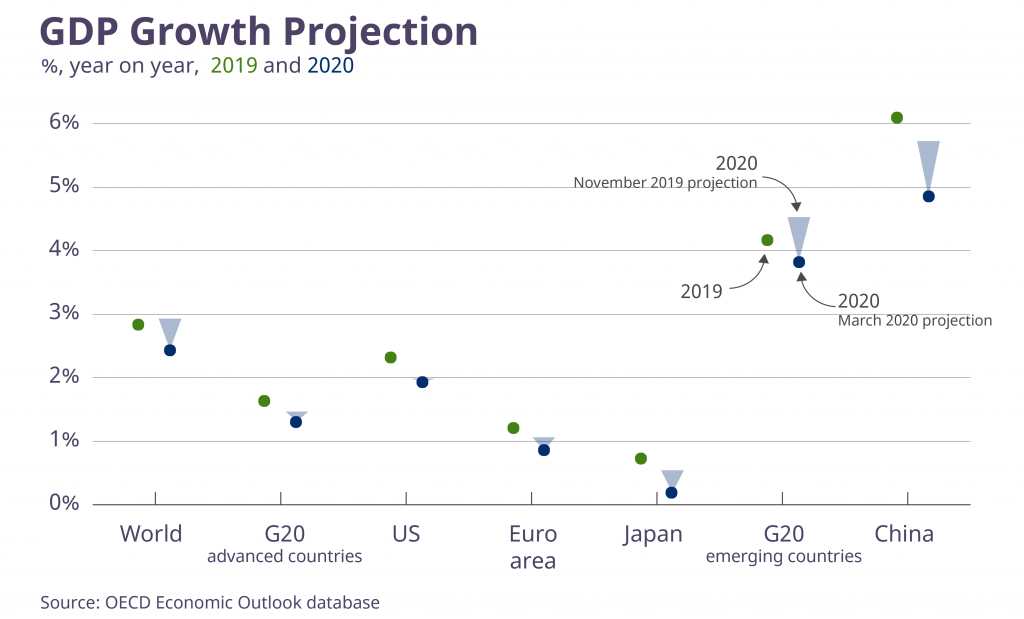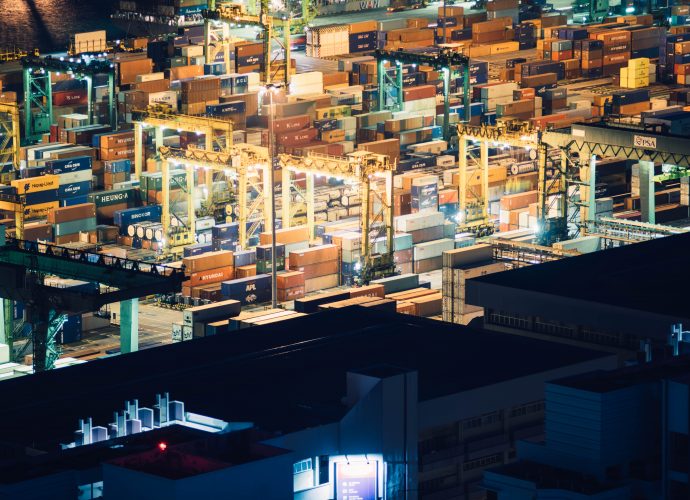The impact of the Covid-19 outbreak on economic prospects is severe and must be limited by coordinated action.
According to the OECD’s latest Interim Economic Outlook, a prolonged outbreak of coronavirus could halve the forecast global growth rate from almost 3% to 1.5% this year:

Global growth was weak but stabilising until the coronavirus Covid-19 hit. Restrictions on movement of people, goods and services, and containment measures such as factory closures have cut manufacturing and domestic demand sharply in China and neighbouring Asian economies relying heavily on trade with this country.
The rapid spread of the new coronavirus has increased fears of a pandemic, sending global markets into a dive last week and prompting governments and central bankers to step up control measures. The negative impact of the coronavirus on the rest of the world through disruptions in supply chains, reduction of commodities trade, cancellations in business travel and tourism as well as lower consumer confidence is growing.
The OECD proposed three scenarios of the impact of COVID-19 outbreak on global economy:
1. Base scenario: temporary blow
-
- Severe, short-lived downturn in China, where GDP growth falls below 5% in 2020 after 6.1% in 2019, but recovering to 6.4% in 2021.
- In Japan, Korea, Australia, growth also hit hard then gradual recovery.
- Impact less severe in other economies but still hit by drop in confidence and supply chain disruption.
2. Domino scenario: broader contagion
-
- Intensity of China impact repeated in northern advanced economies severely hitting confidence, travel, and spending.
- Global growth could drop to 1.5 per cent in 2020, half the rate projected before the virus outbreak.
- Recovery much more gradual through 2021.
3. Governments must act now
-
- Help health care sector, affected industries and workers, boost investment to accelerate recovery.
- If epidemic spreads, coordinate international action.
- Protect the most vulnerable health and income; buffer the shock through tax and credit change easing and flexible working.
Even in the best-case scenario of limited outbreaks in countries outside China, a sharp slowdown in world growth is expected in the first half of 2020 as supply chains and commodities are hit, tourism drops and confidence falters. Global economic growth is seen falling to 2.4% for the whole year, compared to an already weak 2.9 % in 2019. It is then expected to rise to a modest 3.3% in 2021.
Growth prospects for China have been revised down sharply to below 5% this year after 6.1% in 2019. Broader contagion across the wider Asia-Pacific region and advanced economies – as has happened in China – could cut global growth to as low as 1.5% this year.
The OECD believes that the coronavirus Covid-19 presents the global economy with its greatest danger since the financial crisis. Covid-19 is spreading from China to other regions causing human suffering and economic disruption. Containment measures and loss of confidence would hit production and spending and drive some countries into recession, including Japan and the euro area.
The OECD calls on governments to act immediately to limit the spread of the coronavirus, protect people and businesses from its effects and shore up demand in the economy. Flexible working should be used to preserve jobs. Governments should implement temporary tax and budgetary measures to cushion the impact in sectors most affected by the downturn such as travel and tourism, and the automobile and electronic industries.
Co-ordinated fiscal and monetary stimulus is required to rebuild confidence, the OECD adds. In the most affected countries, adequate liquidity needs to be provided to allow banks to help companies with cash-flow problems while containment measures are in force.
Presenting the Interim Outlook in Paris today, OECD Chief Economist Laurence Boone said: “The virus risks giving a further blow to a global economy that was already weakened by trade and political tensions. Governments need to act immediately to contain the epidemic, support the health care system, protect people, shore up demand and provide a financial lifeline to households and businesses that are most affected.”
Image: chuttersnap











Thanks!
Our editors are notified.